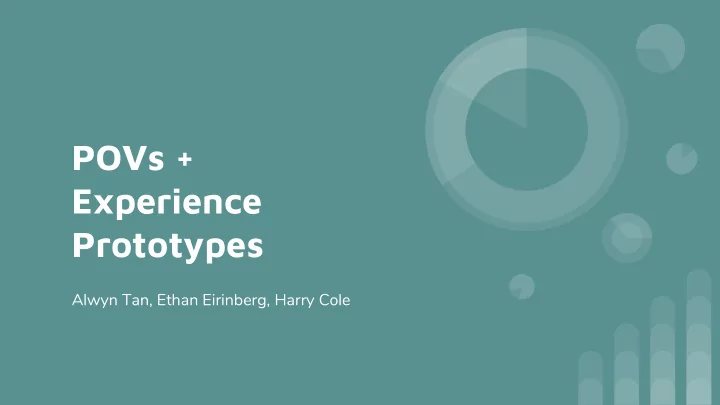

POVs + Experience Prototypes Alwyn Tan, Ethan Eirinberg, Harry Cole
Social Inhibitions and Interactions in Universities
Initial POV WE MET . . . Anna Ceci, a sophomore at Stanford University WE WERE AMAZED . . . That she prioritized friends and community, but found herself very distant from faculty and the administration, as well as having countless half-friendships at Stanford IT WOULD BE GAME CHANGING TO . . . Create natural and easy ways to foster lasting friendships within the community
Hannah LLorin Peer Health Educator at Gavilan, Florence Moore “Match up upperclassmen and freshmen” “Conversations are too professional, make it personal instead” “Make it a taboo to ask about major, internship, career” “School gives different groups with different standards”
Revised POV #1 WE MET . . . Hannah LLorin, a Peer Health Educator at Gavilan WE WERE AMAZED . . . That she found “professional” talk at Stanford to be a big problem IT WOULD BE GAME CHANGING TO . . . Facilitate ways for other people to open up to deeper and more personal conversations
How Might We . . . ? - Prevent students from avoiding social interactions because of busyness or inconvenience? - Put more emphasis on personal rather than professional/academic talk in college? - Facilitate an environment where students can interact freely and have more meaningful conversations?
Solution: Service that connects people to others with something in common within existing groups
People Connector Assumption: People need something in common to start a conversation Questionnaire was People found things in too open ended common to talk about
Surprises + New Learnings Assumption: People need something in common to start a conversation People ended up talking about school, even if interest survey was about extracurriculars Knowing common interest didn’t make things natural
Chynna Obana Student Services Coordinator of Art and Art History at Stanford “I give my advisees contacts, but don’t know whether they follow through” “It’s hard to get people to show up to student mixers here” “People don’t come to me when things are going well”
Revised POV #2 WE MET . . . Chynna, student service coordinator, Stanford arts. WE WERE AMAZED . . . That she doesn’t know whether people follow through on her advice IT WOULD BE GAME CHANGING TO . . . Make it more likely for students to listen for her advice and also to help her foster a stronger bond within her and her advisees.
How Might We . . . ? - Ensure advisees follow through on advice given? - Make it more likely that students will reach out to someone after being given a contact/referral? - Build stronger disciplines within majors/departments of study in college
Solution: Service that helps you meet someone new with the help of a friend
The Wingman Assumption: People find it hard to do things themselves, and need others to validate them Contact n a m g n i W e r s U The person got to meet the contact that she was assigned Feels too “stalker-ish” easily and naturally
Surprises + New Learnings Assumption: People find it hard to do things themselves, and need others to validate them The “wingman” ended up not talking much throughout the whole interaction, and the user seemed to kick the “wingman” out of the equation. If this type of app existed, people would definitely have questioned if the meetup was purely by coincidence or staged
Will Johnson Student at UT Austin “Going out on weekends can help me break out of my comfort zone, meet new people” “It’s hard to be very social and still be a good student” “Lots of social cliques at school”
Revised POV #3 WE MET . . . Will Johnson, sophomore at UT Austin. WE WERE AMAZED . . . That party culture helps him get out of his shell and meet new people, despite the cliques within it. IT WOULD BE GAME CHANGING TO . . . Facilitate more inclusive activities within the community
How Might We . . . ? - Create strong social cultures while avoiding cliques? - Tap into social situations where people feel free to step outside of their social groups? - Help people remain social while keeping up with other responsibilities in college?
Solution: Service that connects your group to other small groups to do activities that require larger groups
Group-Maker Assumption: Sometimes people just need bigger groups to do certain things they want Excited by the idea of getting Unable to hit desired group to do things like paintball that member limits they can’t do as a small group
Surprises + New Learnings Assumption: Sometimes people just need bigger groups to do certain things they want When it comes to planning more elaborate events, most people want to just “join” the groups but not “create” it People are more willing to meet new people if they already know multiple people well in the group
Questions?
Recommend
More recommend